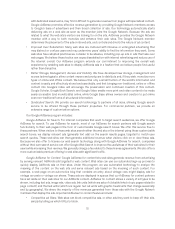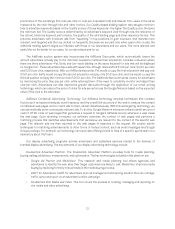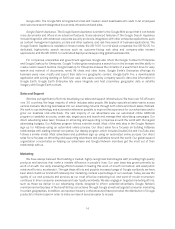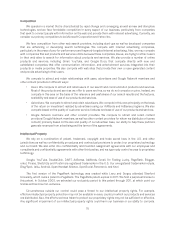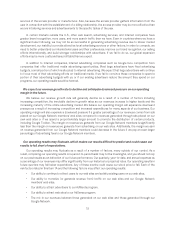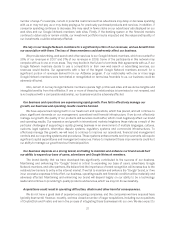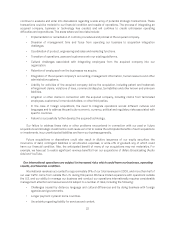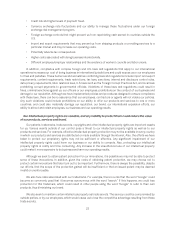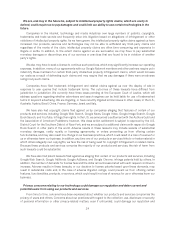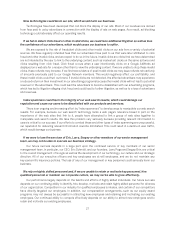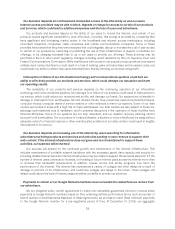Google 2008 Annual Report Download - page 36
Download and view the complete annual report
Please find page 36 of the 2008 Google annual report below. You can navigate through the pages in the report by either clicking on the pages listed below, or by using the keyword search tool below to find specific information within the annual report.• The amount and timing of operating costs and capital expenditures related to the maintenance and
expansion of our businesses, operations, and infrastructure.
• Our focus on long-term goals over short-term results.
• The results of our investments in risky projects.
• Our ability to keep our web sites operational at a reasonable cost and without service interruptions.
• Our ability to achieve revenue goals for partners to whom we guarantee minimum payments or pay
distribution fees.
• Our ability to generate revenue from services in which we have invested considerable time and resources,
such as YouTube and Google Checkout.
Because our business is changing and evolving, our historical operating results may not be useful to you in
predicting our future operating results. In addition, advertising spending has historically been cyclical in nature,
reflecting overall economic conditions as well as budgeting and buying patterns. For example, in 1999, advertisers
spent heavily on internet advertising. This was followed by a lengthy downturn in ad spending on the web. Also,
user traffic tends to be seasonal. Our rapid growth has tended to mask the cyclicality and seasonality of our
business. As our growth rate has slowed, the cyclicality and seasonality in our business has become more
pronounced and caused our operating results to fluctuate.
If we do not continue to innovate and provide products and services that are useful to users, we may
not remain competitive, and our revenues and operating results could suffer.
Our success depends on providing products and services that make using the internet a more useful and
enjoyable experience for our users. Our competitors are constantly developing innovations in web search, online
advertising and web based products and services. As a result, we must continue to invest significant resources in
research and development in order to enhance our web search technology and our existing products and services
and introduce new products and services that people can easily and effectively use. If we are unable to provide
quality products and services, then our users may become dissatisfied and move to a competitor’s products and
services. In addition, these new products and services may present new and difficult technology challenges, and
we may be subject to claims if users of these offerings experience service disruptions or failures or other quality
issues. Our operating results would also suffer if our innovations are not responsive to the needs of our users,
advertisers and Google Network members, are not appropriately timed with market opportunities or are not
effectively brought to market. As search technology continues to develop, our competitors may be able to offer
search results that are, or that are seen to be, substantially similar to or better than ours. This may force us to
compete in different ways and expend significant resources in order to remain competitive.
We generate our revenue almost entirely from advertising, and the reduction in spending by or loss of
advertisers could seriously harm our business.
We generated 99% of our revenues in 2007 and 97% of our revenues in 2008 from our advertisers. Our
advertisers can generally terminate their contracts with us at any time. Advertisers will not continue to do business
with us if their investment in advertising with us does not generate sales leads, and ultimately customers, or if we
do not deliver their advertisements in an appropriate and effective manner. In addition, expenditures by advertisers
tend to be cyclical, reflecting overall economic conditions and budgeting and buying patterns. If we are unable to
remain competitive and provide value to our advertisers, they may stop placing ads with us, which would negatively
harm our revenues and business.
The effects of the recent global economic crisis may impact our business, operating results, or
financial condition.
The recent global economic crisis has caused disruptions and extreme volatility in global financial markets
and increased rates of default and bankruptcy, and has impacted levels of consumer spending. These
macroeconomic developments could negatively affect our business, operating results, or financial condition in a
20


